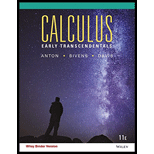
Concept explainers
(a) Use Theorem
(b) Prove that if
(c) Conclude from part (a) and (b) that
Want to see the full answer?
Check out a sample textbook solution
Chapter 1 Solutions
CALCULUS EARLY TRANSCENDENTALS W/ WILE
Additional Math Textbook Solutions
Calculus, Single Variable: Early Transcendentals (3rd Edition)
Calculus and Its Applications (11th Edition)
Thomas' Calculus: Early Transcendentals (14th Edition)
Calculus: Early Transcendentals (2nd Edition)
- If a functionfis increasing on (a,b) and decreasing on (b,c) , then what can be said about the local extremum offon (a,c) ?arrow_forwardSuppose f and g are continuous on [0, 1], f(0) < g(0) and f(1) > g(1). Show that there exists a point c in the open interval (0, 1) such that f(c) = g(c).arrow_forwardThe book is called ESSENTIAL CALCULUS: EARLY TRANSCENDENTALS second editionarrow_forward
- prove if this 2 statments are true or not.arrow_forward(6) Let f be a function with domain R. Assume f is increasing and bounded above. Let M be the supremum of f. Prove that lim f(x) = M. Note: You will need to use the definition of supremum of a function and the definition of lim f(x). Do not make any unwarrented assumptions about the function f; for example, do not assume f is continuous or that lim f(r) exists (you must show it exists).arrow_forwardLet f and g be functions that are continuous on [a, b] and differentiable on (a, b). Show that there exists at least one point CE (a, 6) such that: IS(0) - f(a}) g'(c) = I9(b) – g(a)] (c). State explicitly every theorem you use in your proof, and why it is applicable. Hint: define a new function h(x) = af(x) - Bg(r) on (a, b] for suitable constants a and 3.arrow_forward
- Let a and b represent real numbers. Define ax² + x - b, ax + b, 2ax f(x): a = b = (a) Find the values of a and b such that f is continuous on the entire real number line. (c) Let g(x) - (b) Evaluate lim f(x). X→ 3 Need Help? Submit Answer 7, = f(x) x - 1 if x ≤ 2 if 2 < x < 5. if x 25 Read It Evaluate lim g(x). X→1arrow_forwardCharacterize the discontinuity for F(X)arrow_forwardIf a function fƒ : R" → R is differentiable at Xo, prove that f is continuous there. Let ƒ : R” → R. Assume that there is an affine function T(X) such that T(Xo) = f(Xo) and ƒ(X) – T(X) lim X-Xo ||X-Xo||² Must f be differentiable at Xo? Prove or give a counterexample. = 0.arrow_forward
- If f (3) = 5 and lim,3 f(x) = 5, then f is continuous at 3. True Falsearrow_forward10) The function f below satisfies Rolle's Theorem in the interval [a, b] because (a) f is continuous on [a, b] (b) f is differentiable on (a, b) (c) f(a) = f(b) = 0 (d) All three statement; A, B, and C (e) None of thesearrow_forwardLet f(x) be defined on an interval (a,b) and suppose that f(c) #0 at some c where f(x) is continuous. Show that there is an interval (c-8,c+8) about c where f has the same sign as f(c). From the definition of continuity, what is known about the function? Of(c) exists O lim f(x) exists X-C O. lim f(x)=f(c) X-C All of the above. C Which of the following statements is the condition of a limit? OA. A limit f(c) exists if, for every number 8>0, there exists a corresponding number e > 0 such that for all x, 0e. OB. A limit f(c) exists if, for every number 8>0, there exists a corresponding number e > 0 such that for all x, 0 0, there exists a corresponding number 8 >0 such that for all x, 0e. OD. A limit f(c) exists if, for every number e > 0, there exists a corresponding number 8 >0 such that for all x, 0arrow_forwardarrow_back_iosSEE MORE QUESTIONSarrow_forward_ios
 Algebra & Trigonometry with Analytic GeometryAlgebraISBN:9781133382119Author:SwokowskiPublisher:Cengage
Algebra & Trigonometry with Analytic GeometryAlgebraISBN:9781133382119Author:SwokowskiPublisher:Cengage

